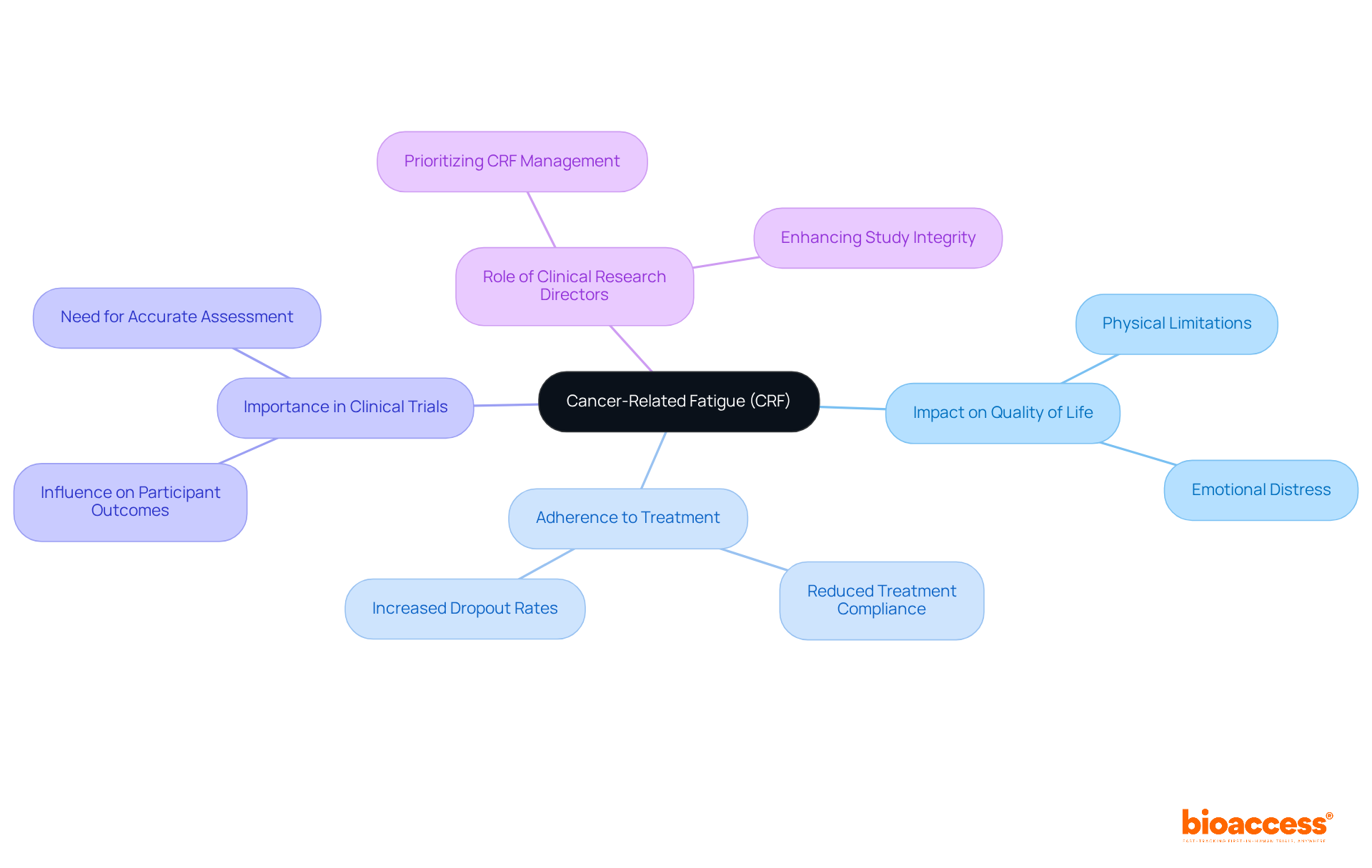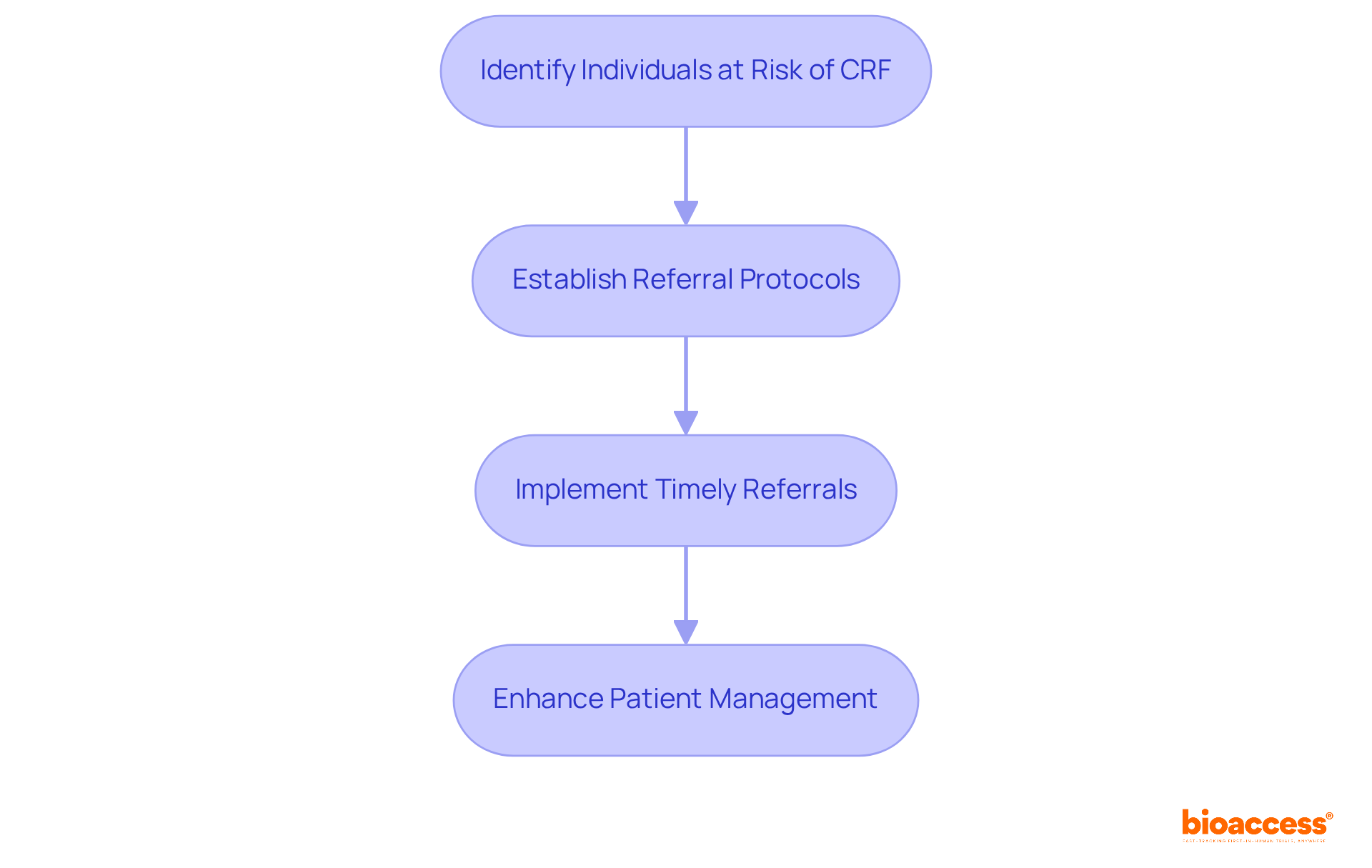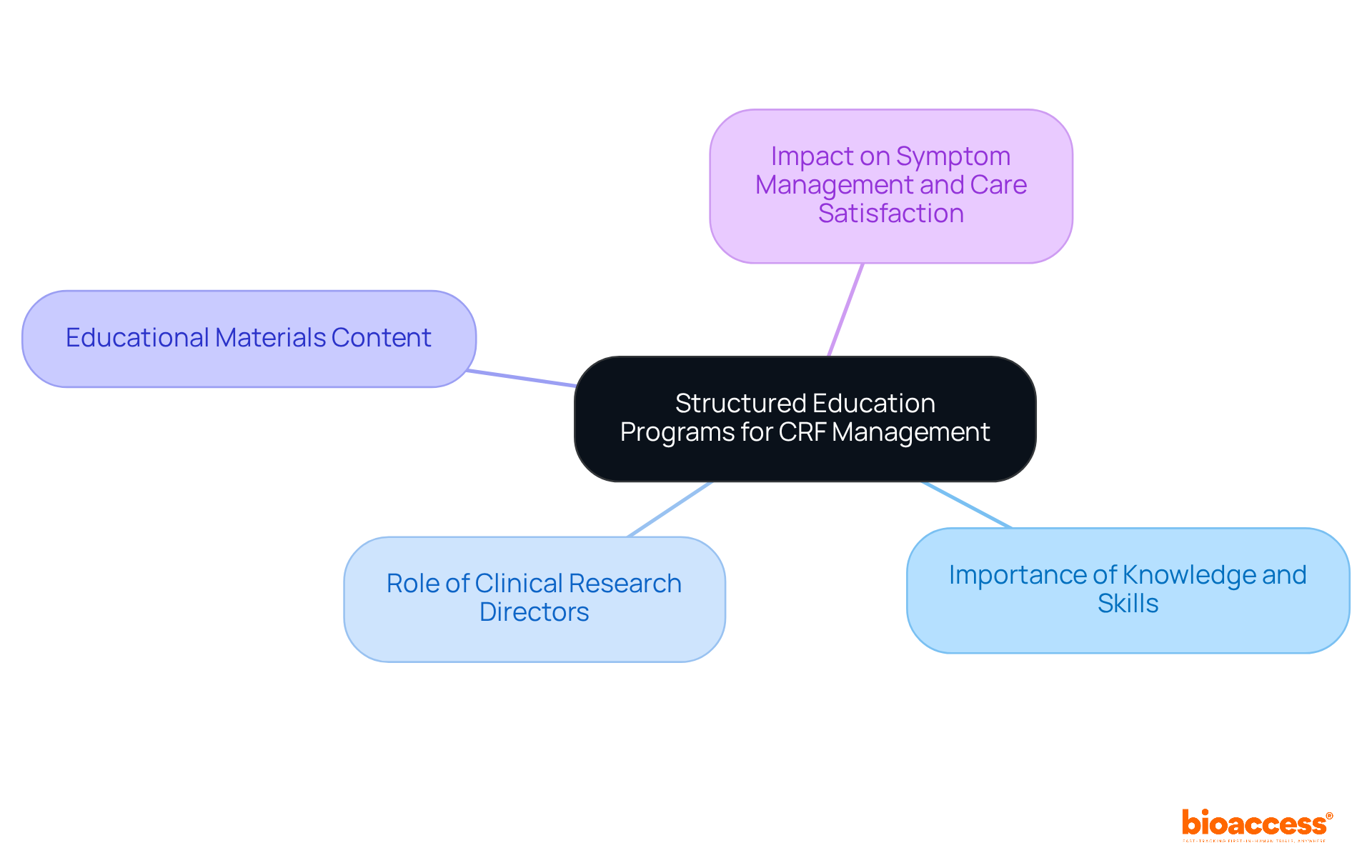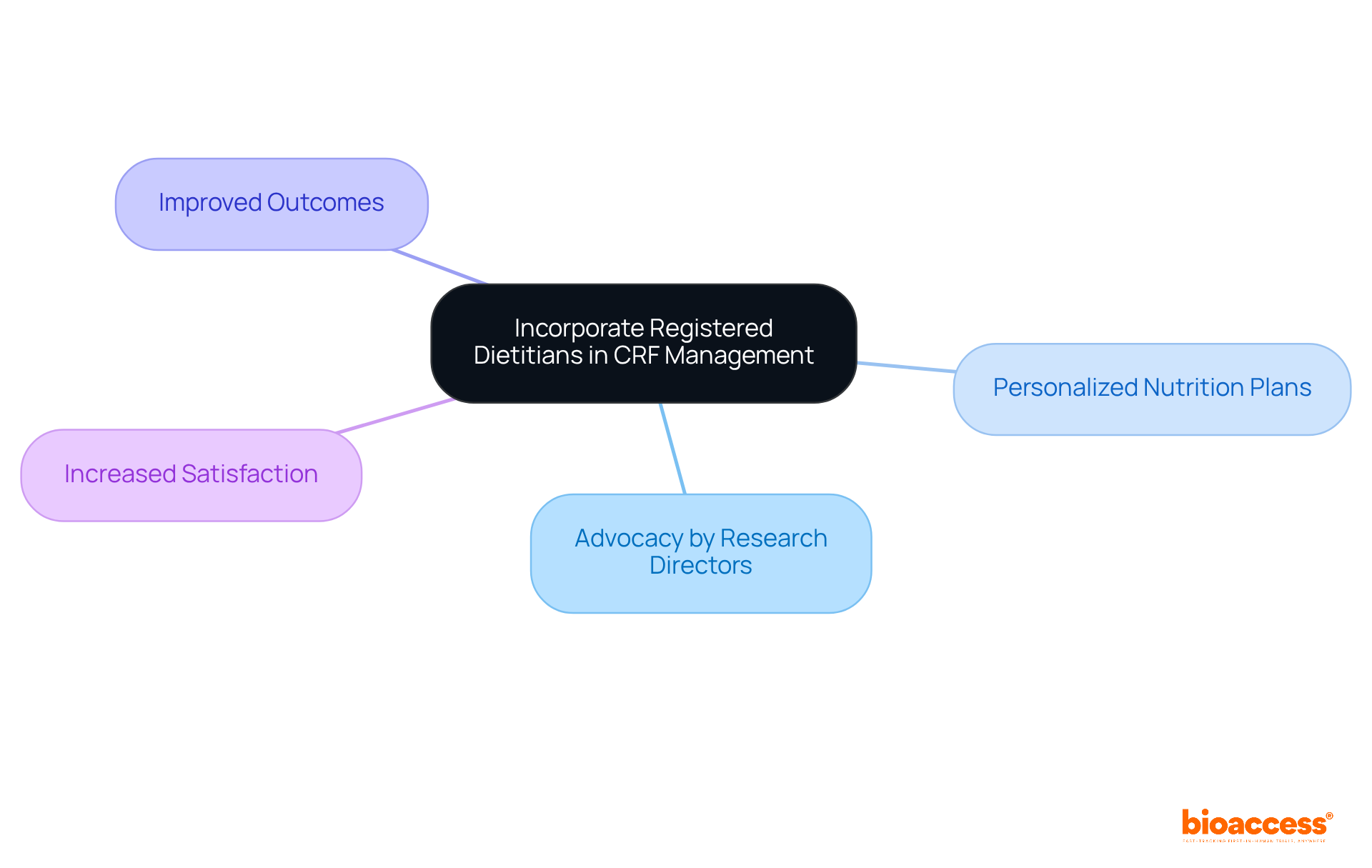


This article delineates essential strategies for Clinical Research Directors aimed at effectively managing Cancer-Related Fatigue (CRF) within clinical trials. It underscores the significance of:
By implementing these approaches, the article argues, patient outcomes are enhanced, and the overall integrity of research findings is fortified.
Understanding the complexities of Cancer-Related Fatigue (CRF) is essential for clinical research directors who aim to improve patient outcomes in clinical trials. By implementing effective management strategies, these professionals can enhance the quality of research and significantly impact the lives of individuals battling cancer. However, a pressing challenge remains: how can directors ensure their approaches address the multifaceted nature of CRF while navigating the intricacies of clinical research? This article explores ten essential strategies that empower clinical research directors to tackle CRF effectively and foster better care for their patients.
bioaccess® leverages its extensive knowledge and regional advantages to deliver exceptional research services. By harnessing Colombia's competitive strengths—such as cost efficiency, rapid regulatory processes, and high-quality healthcare—bioaccess® enables research directors to significantly accelerate their studies.
The total IRB/EC and MoH (INVIMA) review in Colombia takes merely 90-120 days, facilitating swift trial set-up and approval. This unparalleled agility not only shortens timelines but also enhances the overall quality of research outcomes.
As a vital partner for pioneering Medtech, Biopharma, and Radiopharma companies, bioaccess® stands at the forefront of research trends in 2025, ensuring successful collaborations that drive innovation and improve care for individuals.
With the integration of AI in healthcare, as underscored in recent studies, bioaccess® is poised to leverage these advancements, enhancing diagnostics and personalizing treatment plans. Furthermore, the evolving role of telehealth within a hybrid healthcare model underscores the importance of flexibility in medical research, enabling routine check-ups and consultations to be conducted remotely.
By staying attuned to these trends, bioaccess® not only accelerates research but also elevates the entire experience for individuals, establishing itself as an indispensable partner in the quest for medical advancement.

Cancer-Related Fatigue (CRF medical) is a significant and debilitating symptom faced by individuals with cancer, profoundly impacting their quality of life and adherence to treatment. Understanding CRF medical is crucial for clinical trials, as it can directly influence participant outcomes and the overall success of the study.
Clinical Research Directors must prioritize the assessment and management of CRF medical to ensure that trial results accurately reflect the efficacy of interventions and the authentic experiences of individuals. By addressing CRF, researchers can enhance the integrity of their findings and contribute to more effective cancer care.

Implementing early referral strategies for individuals experiencing CRF medical conditions is crucial for enhancing their management and overall treatment experience. Clinical Research Directors must establish protocols to identify individuals at risk of CRF medical issues, ensuring timely referrals to specialized care teams. This proactive approach not only addresses fatigue early but also fosters improved engagement and adherence to treatment protocols. By prioritizing these strategies, we can significantly impact patient outcomes and streamline care processes.

Structured education programs for CRF management are crucial in equipping individuals with the necessary knowledge and skills to effectively manage their symptoms. Clinical Research Directors must develop comprehensive educational materials that encompass the nature of CRF, its impact on treatment, and effective coping strategies. By fostering understanding among individuals, these programs can lead to improved symptom management and greater satisfaction with care.

Optimizing treatment protocols to address CRF medical is crucial for enhancing outcomes in clinical trials. Clinical Research Directors must collaborate with multidisciplinary teams to develop protocols that integrate fatigue management strategies alongside standard treatment regimens. This comprehensive approach ensures that CRF medical conditions are adequately addressed and that patients receive thorough care throughout their treatment journey.

Integrating registered dietitians into the management of Cancer-Related Fatigue is essential for providing individuals with customized nutritional assistance tailored to their specific needs. Research Directors must advocate for the inclusion of dietitians in care teams, as this collaboration is crucial for developing personalized nutrition plans that effectively reduce fatigue and enhance overall well-being. Such a proactive approach not only leads to improved outcomes but also significantly increases satisfaction for individuals receiving care.

The effective evaluation of Cancer-Related Fatigue (CRF) in research studies is crucial for understanding its impact on individual outcomes. Clinical Research Directors must utilize validated assessment tools and methodologies to measure CRF accurately. By conducting regular assessments throughout the study, trends can be identified, informing necessary adjustments to treatment protocols. This approach ultimately enhances the quality of data collected and contributes to the overall success of the trial.

Recognizing and addressing obstacles in CRF medical management is crucial for enhancing care in clinical trials. Clinical Research Directors must conduct regular evaluations of CRF management strategies to identify barriers such as:
By proactively addressing these challenges, teams can significantly enhance the effectiveness of CRF medical management and improve overall trial outcomes.

Promoting self-care strategies for individuals experiencing CRF medical is essential for empowering them to manage their symptoms effectively. Clinical Research Directors must provide resources and support to encourage engagement in self-care practices such as:
By motivating individuals to actively participate in their care, we can enhance symptom management and significantly improve their quality of life.

Providing ongoing assistance and resources for individuals facing cancer-related fatigue (CRF medical) is crucial for their well-being throughout clinical trials. It is imperative for Clinical Research Directors to establish robust support systems that encompass access to:
By guaranteeing that patients have continuous access to these resources, research teams can significantly enhance patient engagement, adherence to treatment protocols, and overall satisfaction with their care.

Understanding and managing Cancer-Related Fatigue (CRF) is essential for Clinical Research Directors who aim to elevate the quality of clinical trials and patient care. By prioritizing CRF, research teams ensure that treatment efficacy is accurately represented and that the experiences of individuals are genuinely reflected. This focus not only enhances trial outcomes but also fosters a more compassionate approach to cancer care.
The article delineates ten vital strategies that Clinical Research Directors can employ to manage CRF effectively. These strategies include:
Each strategy is critical in addressing the complexities of CRF, promoting better patient engagement, and ultimately leading to improved outcomes. Moreover, the significance of continuous support and self-care strategies is paramount, as they empower patients to take an active role in their health management.
In conclusion, addressing Cancer-Related Fatigue in clinical research holds significance beyond mere trial success; it enhances the overall quality of life for individuals battling cancer. By embracing these essential strategies, Clinical Research Directors can not only fortify the integrity of their studies but also contribute to a healthcare environment that prioritizes patient well-being. Adopting these practices will pave the way for more effective cancer care and a brighter future for patients facing the challenges of CRF.
What is bioaccess® and what services does it provide?
bioaccess® is a research service provider that leverages its extensive knowledge and regional advantages in Colombia to accelerate clinical research for Medtech, Biopharma, and Radiopharma companies.
How does bioaccess® enhance the speed of clinical trials?
bioaccess® enhances the speed of clinical trials by utilizing Colombia's competitive strengths, such as cost efficiency, rapid regulatory processes, and high-quality healthcare, allowing for a total IRB/EC and MoH (INVIMA) review in just 90-120 days.
What are the benefits of the rapid review process in Colombia?
The rapid review process in Colombia shortens trial setup and approval timelines, which enhances the overall quality of research outcomes.
How is bioaccess® positioned for future trends in research?
bioaccess® is positioned at the forefront of research trends in 2025, focusing on successful collaborations that drive innovation and improve care, particularly through the integration of AI in healthcare and the evolving role of telehealth.
What is Cancer-Related Fatigue (CRF) and why is it important in clinical trials?
Cancer-Related Fatigue (CRF) is a significant and debilitating symptom faced by individuals with cancer that impacts their quality of life and treatment adherence. Understanding CRF is crucial for clinical trials as it influences participant outcomes and the overall success of the study.
How should Clinical Research Directors address CRF in trials?
Clinical Research Directors should prioritize the assessment and management of CRF to ensure trial results accurately reflect the efficacy of interventions and the authentic experiences of individuals, thereby enhancing the integrity of their findings.
What are early referral strategies for managing CRF patients?
Early referral strategies involve establishing protocols to identify individuals at risk of CRF and ensuring timely referrals to specialized care teams, which helps address fatigue early and improves engagement and adherence to treatment protocols.
What impact do early referral strategies have on patient outcomes?
By implementing early referral strategies, patient outcomes can be significantly improved, and care processes can be streamlined, leading to better management of CRF conditions.